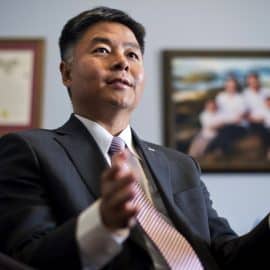


| Personal Brand Presence | 7 / 10 |
| Authoritativeness | 7 / 10 |
| Expertise | 7 / 10 |
| Influence | 6 / 10 |
| Overall Rating | 7 / 10 |
Since 2023, Ted W. Lieu, an American lawyer, politician, and former military officer, has served as the 36th congressional district’s representative in the US House of Representatives representing California. From 2015 until 2023, he served as the 33rd congressional district’s representative.
One of the 18 members of Congress who became naturalized citizens of the United States after leaving Taiwan at the age of three is Lieu. After winning the election to succeed Senator Jenny Oropeza, who passed away, he served as the 28th district’s representative in the California State Senate from 2011 to 2014. He was elected to replace the late Assemblyman Mike Gordon and served as a California State Assemblyman for the 53rd district from 2005 to 2010.
From 1995 until 1999, Lieu was assigned to the Judge Advocate General’s Corps of the US Air Force while serving on active service. He was a member of the Air Force Reserve Command from 2000 until 2021, rising to the rank of colonel in 2015. Lieu was designated assistant whip of the 115th Congress in 2017 by House Democratic Leader Nancy Pelosi. Since 2023, he has served as the House Democratic Caucus vice chair.
Bipartisan support and interest in AI have increased within the last 12 months. Over thirty measures pertaining to artificial intelligence have been submitted in this Congress, and nearly thirty hearings on the topic have been held by House and Senate committees this year alone. Two sets of senators, one from each party, have unveiled their own frameworks for comprehensive AI legislation. A number of AI proposals that primarily addressed the internal use of AI by the federal government have also been put to a vote and approved by committees.
In the meantime, the Biden Administration has said that it would implement an extensive executive order this autumn to address various AI threats in accordance with current legislation. In an effort to encourage the responsible development and application of AI systems, the Administration has also taken action, obtaining voluntary pledges on AI safety and transparency from fifteen IT firms.
The prospects for comprehensive AI legislation are still unclear in the absence of a developing consensus. However, in both chambers of Congress, over a dozen bipartisan measures have been presented on a variety of particular AI-related themes at the same time. Thus far, targeted legislation has been introduced with the aim of securing the U.S. elections from deepfakes and other AI-generated misinformation, advancing U.S. leadership in AI R&D, safeguarding national security, requiring disclosure of AI use, addressing the effects of AI on American workers, and assisting the federal government in utilizing AI to provide services. Given the broad interest in AI concerns and the backing from both parties, it seems possible that at least some specific AI legislation will soon be passed into law.
Solana has demonstrated strong performance, driven by increasing adoption, institutional interest, and key partnerships, while facing potential ...
Know MoreIn April 2025, the crypto space focused on strengthening core infrastructure, with Ethereum preparing for the Pectra ...
Know More